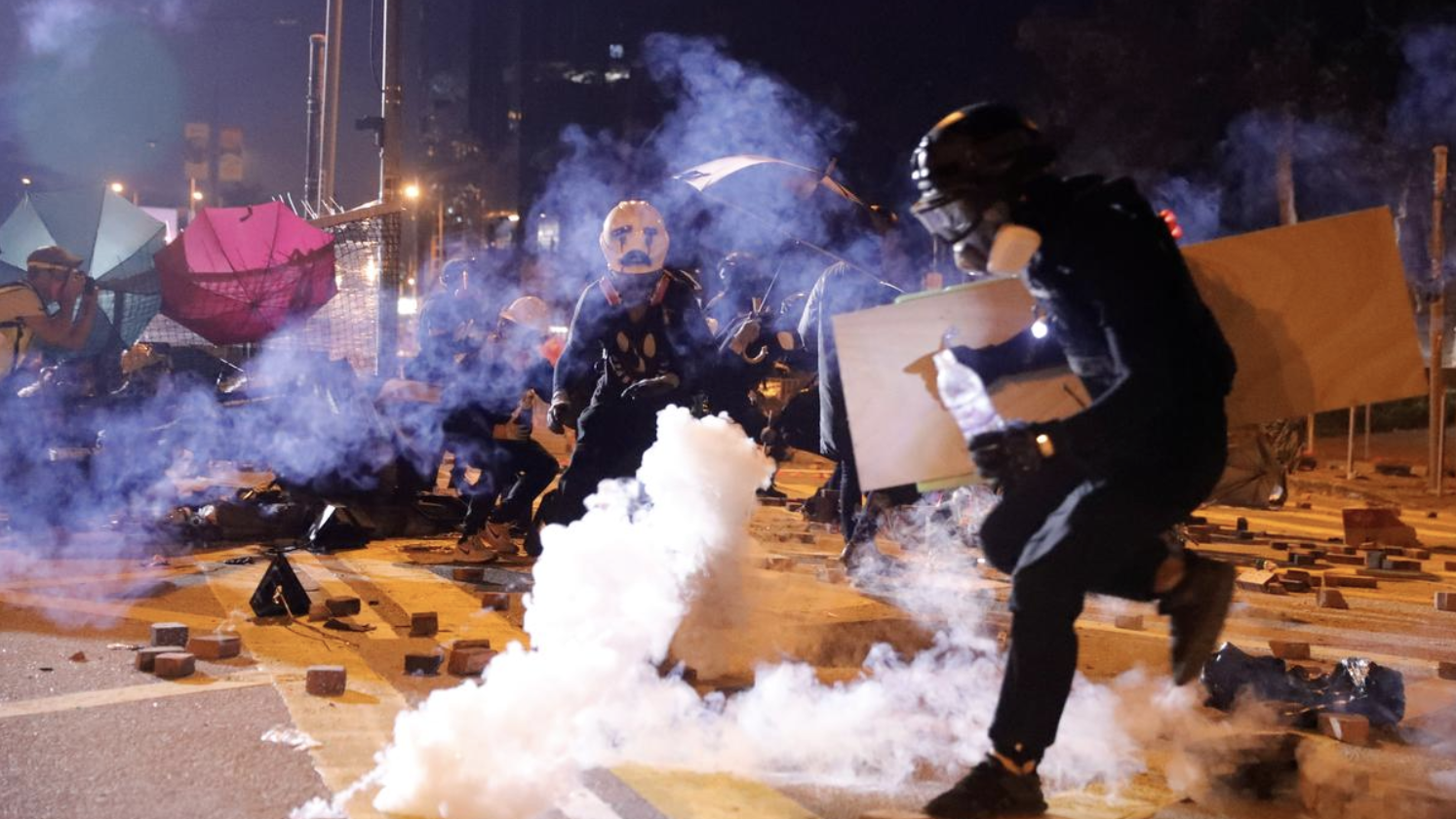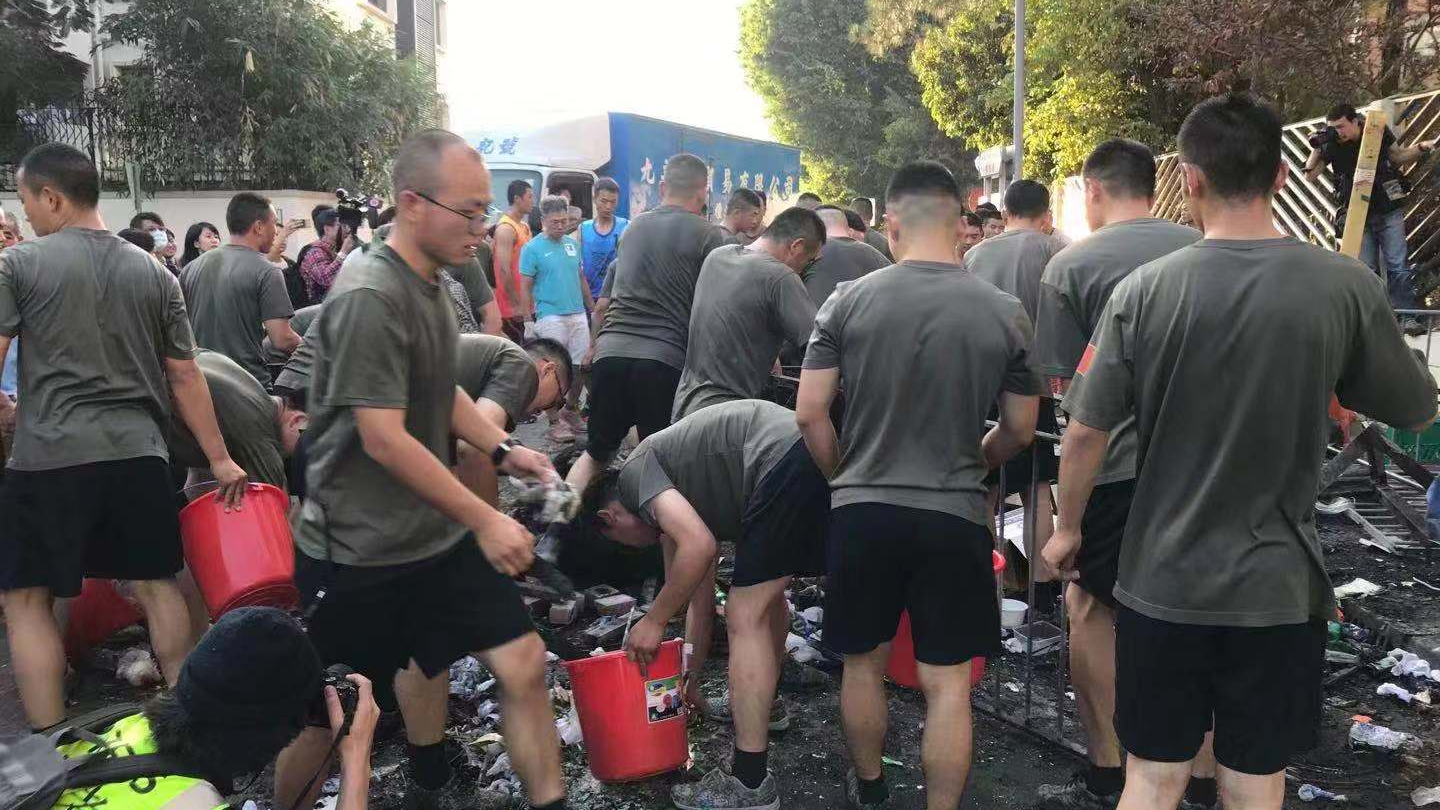
Rioters outside the Hong Kong Polytechnic University (PolyU) in the Hong Kong Special Administrative Region, China, November 16, 2019. /Photo via Reuters
Rioters outside the Hong Kong Polytechnic University (PolyU) in the Hong Kong Special Administrative Region, China, November 16, 2019. /Photo via Reuters
Editor's note: Lu Yang is an independent researcher and a PhD candidate of Uni Freiburg, Germany, where she majors in legal theory and political theory. The article reflects the author's opinions, and not necessarily those of CGTN.
Asian protesters wearing MAGA hats, waving American flags, chanting the Star-Spangled Banner on the streets of their own home – Hong Kong – this bizarre scene could give those politically-correct Americans bittersweet nausea.
Established discourses labeling them "democracy fighters" or "human rights guards" all seem but too pale and powerless to really capture the true spirit of this oddly-dressed group of people. But some crooked media choose to repeatedly portray the protesters as innocent angels till the definition of insanity gets embodied or finally someone realizes, "but they dress just like the alt-right!"
Yep, the similarity is not merely coincidental but sheds important light on the ugly truth behind the long-going and ever-severe Hong Kong crisis, while challenging the dominant narrative by far, the economic theory.
Surely, there are the issues of oligopoly – especially when one looks at the real estate conglomerates in Hong Kong – the global economic slowdown, the U.S.-China trade war, also the undeniable foreign interference and colonial legacy; we can also reserve the logic by claiming that the failure of integration is due to insufficient integration efforts, such as the "education deficiency" as most Hong Kong residents have not been well-educated about the mainland. Those are all important contributing factors to the crisis, but to be complacent with those easy answers would only cloud the crucial cause and connection.
The protesters' slogan -"liberate Hong Kong, the revolution of our times," – reveals a lot. I believe that the crisis Hong Kong currently faces is essentially one that involves identity, but not an economic one.
Identity is a simplified way to locate ourselves in the social hierarchy; it's a package of guaranteed benefits and obligations. Hong Kong's young people on the street are as angry at potential "identity theft" as the identitarians in Europe and North America.
What happened in Charlottesville, Virginia (where a white supremacist rally occurred in 2017), and Hong Kong are part of the global right-wing surge. Hong Kong protesters share the same paranoia and conspiracy theories of most Trump voters – the deep fear of losing status, and of the coming "grand replacement" with cooperation of local "replacist" elitists.

PLA soldiers help clear up roadblocks near Hong Kong Baptist University, the Hong Kong Special Administrative Region, China, November 16, 2019. /CGTN Photo
PLA soldiers help clear up roadblocks near Hong Kong Baptist University, the Hong Kong Special Administrative Region, China, November 16, 2019. /CGTN Photo
Same as the 2016 U.S. election, the current contra-traditional unrest in Hong Kong is an effort by members of the already dominant groups to assure their continued dominance over the outsiders.
It is a purr to the West and a shout to Beijing in hope of securing if not advancing all the privileges Hong Kong people currently enjoy both in the Western world and in the Chinese mainland over other Chinese people.
For a very long time, just like the Jews in Nazi Germany, Muslims in Europe, Mexicans in the U.S., mainland people have been scapegoated as "the others" in the constitution of the Hong Kong people's identity.
That's why the more successful the integration between the mainland and Hong Kong becomes, the more anxious the small fraction of Hong Kong "separatists" will feel; the more Beijing stands for openness and globalization, the more some Hong Kong people stand for xenophobia and closeness; the more friendly the central government appears, the more violently Hong Kong protesters will behave; the more prosperous the mainland's economy is, the more threatened and anxious some Hong Kong people will feel.
We may derive from this a better understanding of why violent Hong Kong protesters' stories alleging police brutality quickly lose credibility and hardly attract sympathy from mainland people.
What the Chinese word "guang fu" in the slogan subtly suggests is the deep nostalgia that a minority of Hong Kong people have felt toward the 1980s, which they thought was once the golden era of Hong Kong, when Hong Kong people were the proud representatives of an "advanced" and rich Western lifestyle and commercial civilization, when the gap between Hong Kong and the mainland was the greatest. The toxic sense of superiority was also in this way built into the Hong Kong identity.
The gap has been quickly narrowed. The booming mainland, globalization and multipolarization are continually reshaping the global power balance.
However, the transformation has hit some Hong Kong people even harder as they first-handedly experienced the contrast and shift. The sense of loss and pain has pushed some local groups to increase their support for the radical candidates who are most keen to emphasize reestablishing the status hierarchies of the so-called good old days.
Self-pity is a sin of pride. "Be water, my friend." Instead of carving on gunwale of a moving boat (Chinese phrase, "ke zhou qiu jian"), below the Lion Rock, into the Greater Bay Area, Hong Kong people today have all the freedom and bravery to create their unanchored new identity in the era of glocalization.
(If you want to contribute and have specific expertise, please contact us at opinions@cgtn.com.)